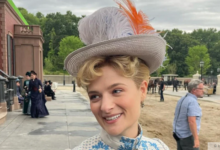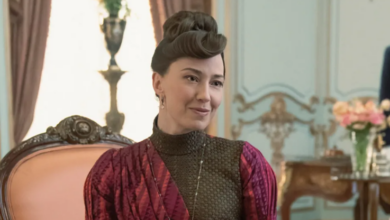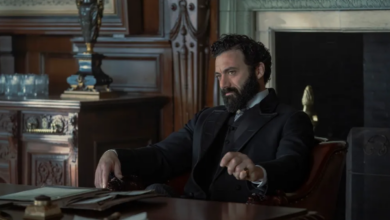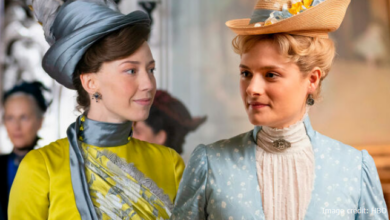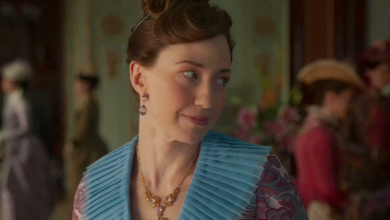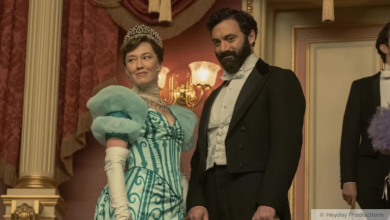Interview: Cynthia Nixon on Ada’s Transformation in ‘The Gilded Age’
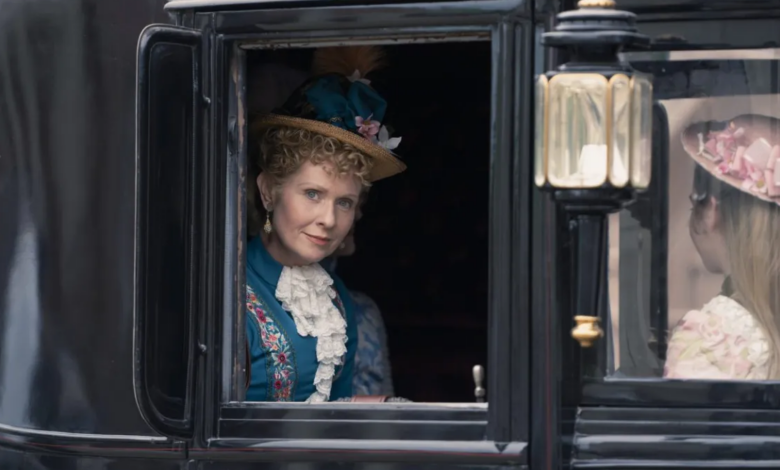
The Gilded Age is the splashy period drama from Julian Fellowes (Downton Abbey) and showrunner Sonja Warfield. It’s an immersive viewing experience, with the acting, the crafts, the writing, and more all working together to transport you to New York during that historical period when robber barons ruled and upper-class opulence was the norm. In addition to the actual riches displayed on screen, the cast of The Gilded Age has a wealth of experience and has elevated well, everything. Cynthia Nixon is one of those cast members, and we were so excited to chat with her about the show.
On The Gilded Age, Nixon plays Ada, the sister of Christine Baranski‘s Agnes van Rhijn. She’s a homebody who lives in the shadow of her domineering sister. The character is very different from what we’ve seen Nixon bring to the screen thus far in her career, and we can’t help but root for Ada and Nixon. Ada’s family is the very definition of old money, complete with marriages and more at the center of keeping the lifestyle they’re accustomed to living going. The family’s fortunes turn this season, but Ada unexpectedly saves everything and comes into her own funds through tragedy in the last few episodes.
Over Zoom, we sat down with Nixon to chat about Ada’s transformation this season and her sibling relationship with Agnes. She shared her hopes for the character in the third season and what it was like to get into the mindset and character of a woman like Ada in the late 19th century. Nixon got very philosophical with the chat, talking about how her portrayal of Ada is based on something very close to her personally. She also talked about the pseudo-motherly relationship between Ada and Louisa Jacobson’s Marian. Read on for the full discussion, or listen to the full audio in the link above. But beware, if you haven’t seen The Gilded Age season 2 yet, check it out because there are some major spoilers ahead.
Ayla Ruby: I’m really excited to chat. Thank you so much for being here. So, this is a very big season for Ada, especially with how it ends. Can you talk a little bit about her transformation, where we meet her in the beginning of the season, to the end?
Cynthia Nixon: Yes. So, I mean, Ada is a person who has very much always lived in her sister’s shadow. Her sister is almost like her mother. And her sister is a very powerful, domineering, vivacious, charismatic powerhouse, and Ada is a much more of a homebody. Shy, fragile, timid.
But what happened to her last season is unexpectedly a wonderful man, who could have chosen a lot of different women, chose her, and married her, and they had this amazing love story. And then he tragically died, but the silver lining was he left her a lot of money, which he had no idea that he had.
And so, when we are going to pick her up in the new season, she has saved the house from having been sold out from under them, and she is now the lady of the household, and the servants answer to her. And on the one hand, her sister is very grateful that the house was preserved, and the fortune was reclaimed. But on the other hand, it’s a brave new world for both of them, with Ada now holding the purse strings, and it’s anybody’s guess how this will play out.
Ayla Ruby: What were your reactions when you saw how that change happened over the season? And I keep thinking of the moment where Bannister looks to Ada and asks her for the okay, for that household order. As an actress, what was that like for you? What was finding that you get to do that?
Cynthia Nixon: I mean, I guess trying to figure out, of course, how… Of course, one is really shocked. One is trying to play catch up. I’m speaking for Ada now. But also, how much of Ada is there that has spent the decades being kicked by her sister, and now thinks, “Oh, if I chose to, I could do a bit of kicking myself.” So, I guess the question is, how much of that All About Eve kind of a person is there really lurking in Ada, and not wanting to overplay that?
Ayla Ruby: How do you find the truth in Ada? You’re 100-some years removed from her. How do you make it relevant, make it… Because she’s so fabulous, and I’m rooting for her so hard.
Cynthia Nixon: Thank you. Of course, it’s very different now than it was then, but I think, still to be a single woman, a woman without a man at home, without a man on her arm, particularly a woman my age, Ada’s age, there is a powerlessness in that.
And I always think about my godmother Denny, who was very dear to me, and who was a person who… She was a godmother to me, but she was a godmother to a couple of dozen young people.
Ayla Ruby: Wow.
Cynthia Nixon: She just doted on young people. And she was kind of an Auntie Mame. She didn’t have Mame’s money, but she loved a party, a play, an outing, a trip, and she was someone who would’ve loved to have been married and had children that were really her children all her own.
But, since life did not bring that to her, she made the most of it, and she just made friends with young people wherever she went. And, I don’t know.
But she did point out… She would always judge the men at a gathering, and she would say, “You see how he never looks in my direction, he never addresses me? It’s like I’m invisible.” And the way Ada dotes on Marian, I mean, I felt very much like that with Denny, her name was Denny, and how she doted on me. So, it’s 150 years later, but some of these things don’t really change.
Ayla Ruby: Yeah, that’s very true. The relationship with Marian is so interesting. And also there’s Agnes. Agnes is just super cruel, it seems like, to everybody. Her son, everybody, and Ada doesn’t approve of that.
Cynthia Nixon: No.
Ayla Ruby: Can you talk about the relationship with the sisters, how they judge each other? Because the sibling rivalry… And I don’t know if rivalry is the right word because they’re not really rivals. There’s a power imbalance. Just how does the relationship between the siblings work?
Cynthia Nixon: Well, Christine Baranski and I worked together first when I was 17, and she was… She’s like 13 years older than me. I thought she was old enough to be my mother. She isn’t, really, but she played my mother when I was a kid.
Of course we really love each other and admire each other. But apart from that, she said, “We’re very lucky that we have each other to play with because we have an intimacy between us that’s very hard to fake.” And that they are sisters, but they’re sisters who live together and have lived together for decades. They’re sisters who are each other’s companions. So, in many ways, they are like a married couple. And they’re like a married couple in which one of the partners is very domineering and runs roughshod over the other one.
But it’s not only that. Agnes does care for Ada and tries to protect her in different ways and stuff. And Ada is very much trying to deal with the emotional reality. In the household of her sister, of her niece, she’s sort of more of an emotional caretaker.
But I think in a marriage, or in a business partnership, in any kind of partnership where you’re with each other day in and day out, you have to pick your battles. And so, while Ada doesn’t like many of the things that Agnes does, particularly where Marian is concerned, she really tries to pick her battles. Because she only has the ability to protest… If you protest all the time, you’re never going to be listened to, so she bides her time.
And when she has to go to the mat, she does, but also, I think, Ada really favors going around behind Agnes’ back and working behind the scenes to do what she can because I think she finds that more effective.
Ayla Ruby: She gives lots of advice to Marian in particular, and just characters are navigating this world with Agnes.
Cynthia Nixon: Yeah. And the thing is, Ada’s very motherly towards Marian, but she identifies with Marian so much, and she feels like mistakes were made in her own life and that she was not… She was financially taken care of to a point, but there was nobody there helping her navigate the waters of courtship, of marriage, of a career, if that’s a possibility. So, I think when she helps Marian, she helps her because she loves her, but she helps her because it’s kind of her way of a do-over of her own life and things that she wished had gone differently.
Ayla Ruby: That’s fair. So, this season feels very, very grand. Things feel much bigger, the stakes feel obviously larger. As an actress, what does that mean for you while filming? You’ve got these amazing costumes, you’ve got these incredible sets. What’s that like?
Cynthia Nixon: I mean, certainly the costumes help you remember that you’re not in 2024. I mean, we’re so casual. We’re so informal. We and um and er all the time, and rub our noses and scratch ourselves. You know what I mean? We’re just very informal to the point of slovenliness, really.
And nothing could be farther from those people who every hair is in place, you don’t raise your voice, you don’t point, you don’t even…. We’re always being called on the carpet for how we eat and hold our wine glasses and… Right? I mean, it’s just a whole different world, and the clothes really help you just remember that. You can’t move that quickly, and you’re wearing gloves, and you’re wearing a hat, never mind a corset.
Ayla Ruby: I can’t even imagine. Was there anything about this era that surprised you, or anything that you’ve learned in the course of doing this, that’s been really interesting or intriguing to you?
Cynthia Nixon: I guess two things, really. One is how everything was in flux. You think everyone was so proper, and there were these strict rules, and if you violated them, forget it. You were dead.
But the fact of the matter is, in any period, there are people who bend the rules, and they bend them to the point of breaking. And the way in which women, the way African Americans, immigrants, everybody, was trying to find their place, and get a little more of a place than the world was offering them, to see what they could do. And, I don’t know, certainly the rules were much stricter than the rules we live with now, but it’s interesting to watch people bend them.
And the other thing, I guess, that intrigued me was that, ostensibly, women have almost no power at all, right? They don’t have careers. They can’t vote. Owning property is difficult at best. There are so many social indiscretions that a woman can commit, and then she’s just completely cut out.
But it’s interesting to me how much the women were… While they were the victims of this, they were also very much the gatekeepers. And that for men in business, you needed social connections to really climb, and the women were the people who would… I mean, you see that very much with the Russells, with Carrie Coon. And Morgan Spector, he’s obviously a brilliant businessman, but he needs his wife, and he needs his wife to be the social dynamo that she is.
Ayla Ruby: Yep. They’re such a great pair.
Cynthia Nixon: They are.
Ayla Ruby: And just watching their story is fantastic. So, you’ve done so many amazing things. Is there anything that has been really challenging, or just super gratifying professionally, that you have been able to do this season, or overall with The Gilded Age and bring to life?
Cynthia Nixon: Yeah. I mean, it was just such a wonderful arc that they gave her. I mean, so many unexpected things that not only did she never think were going to happen in her life, I didn’t think that they were going to happen in her life.
When they told me at the end of season one that she was going to get married the next season, I was like, “What? Are you kidding me?” So, being able to watch her grow from a woman who, in her being in love, became girlish again. And then a married woman, with the, I don’t know, the stature that gave her, and the confidence that gave her, and then the tragedy of her husband dying, and the fact that now she’s the lady of the house. I mean, it was just a glorious… She went through so many changes, but she was up to the task.
Ayla Ruby: Is there anything else you want people to know before we wrap up?
Cynthia Nixon: I don’t know. I’m such a New Yorker. It’s so wild to me to be doing this story about New York, and remember that it literally happened here. Because it feels sometimes like Planet of the Apes. You know the Planet of the Apes, and it’s like, “Oh my God, there’s the Statue of Liberty submerged in sand. It’s actually right here. We’re not on another planet.” Because that’s how it feels.
But yeah, I guess that, and that everything those people did, in good ways and in bad ways, from all of the climate change and the destruction of the planet, that’s when it really started. The Industrial Revolution.
And so, I don’t know, it seems like such a foreign, far-away time, but the roots of everything those people did, in good ways and in bad ways, we are their inheritors. We are their descendants. Not just biologically, in every way, culturally.
Ayla Ruby: That’s such a powerful thing to think about. Thank you. And again, thank you very much for chatting. This has been great.
Cynthia Nixon: Yeah. Thank you. It was a real pleasure.

